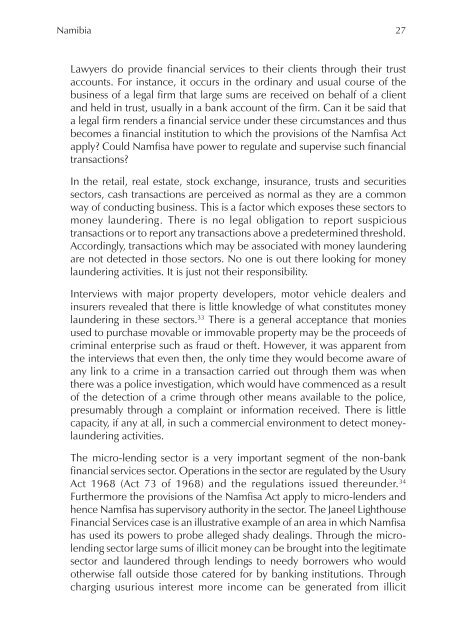Monograph 108 complete download - Institute for Security Studies
Monograph 108 complete download - Institute for Security Studies
Monograph 108 complete download - Institute for Security Studies
Create successful ePaper yourself
Turn your PDF publications into a flip-book with our unique Google optimized e-Paper software.
Namibia<br />
27<br />
Lawyers do provide financial services to their clients through their trust<br />
accounts. For instance, it occurs in the ordinary and usual course of the<br />
business of a legal firm that large sums are received on behalf of a client<br />
and held in trust, usually in a bank account of the firm. Can it be said that<br />
a legal firm renders a financial service under these circumstances and thus<br />
becomes a financial institution to which the provisions of the Namfisa Act<br />
apply? Could Namfisa have power to regulate and supervise such financial<br />
transactions?<br />
In the retail, real estate, stock exchange, insurance, trusts and securities<br />
sectors, cash transactions are perceived as normal as they are a common<br />
way of conducting business. This is a factor which exposes these sectors to<br />
money laundering. There is no legal obligation to report suspicious<br />
transactions or to report any transactions above a predetermined threshold.<br />
Accordingly, transactions which may be associated with money laundering<br />
are not detected in those sectors. No one is out there looking <strong>for</strong> money<br />
laundering activities. It is just not their responsibility.<br />
Interviews with major property developers, motor vehicle dealers and<br />
insurers revealed that there is little knowledge of what constitutes money<br />
laundering in these sectors. 33 There is a general acceptance that monies<br />
used to purchase movable or immovable property may be the proceeds of<br />
criminal enterprise such as fraud or theft. However, it was apparent from<br />
the interviews that even then, the only time they would become aware of<br />
any link to a crime in a transaction carried out through them was when<br />
there was a police investigation, which would have commenced as a result<br />
of the detection of a crime through other means available to the police,<br />
presumably through a complaint or in<strong>for</strong>mation received. There is little<br />
capacity, if any at all, in such a commercial environment to detect moneylaundering<br />
activities.<br />
The micro-lending sector is a very important segment of the non-bank<br />
financial services sector. Operations in the sector are regulated by the Usury<br />
Act 1968 (Act 73 of 1968) and the regulations issued thereunder. 34<br />
Furthermore the provisions of the Namfisa Act apply to micro-lenders and<br />
hence Namfisa has supervisory authority in the sector. The Janeel Lighthouse<br />
Financial Services case is an illustrative example of an area in which Namfisa<br />
has used its powers to probe alleged shady dealings. Through the microlending<br />
sector large sums of illicit money can be brought into the legitimate<br />
sector and laundered through lendings to needy borrowers who would<br />
otherwise fall outside those catered <strong>for</strong> by banking institutions. Through<br />
charging usurious interest more income can be generated from illicit
















